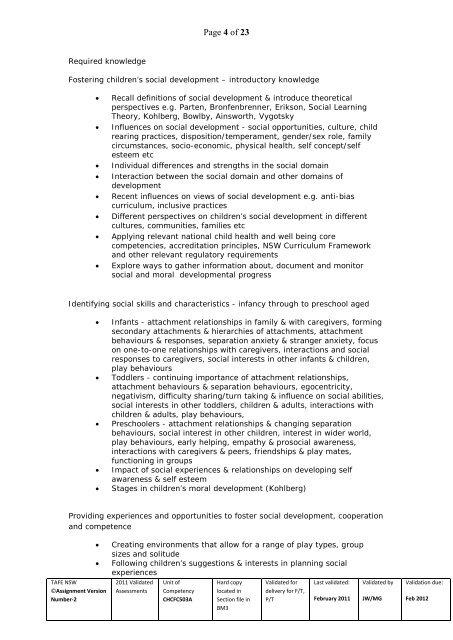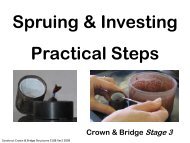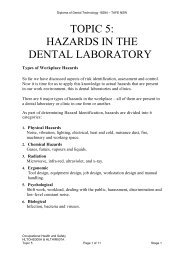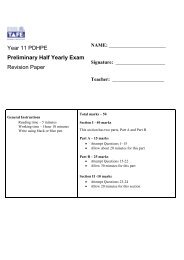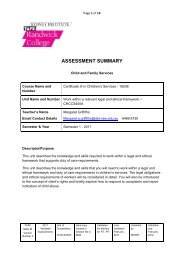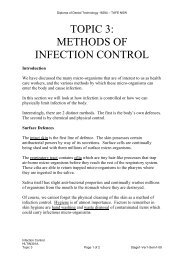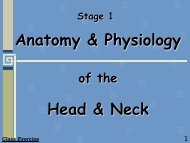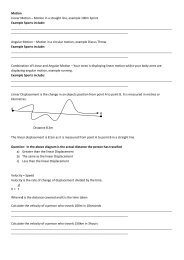CHCFC503A - Randwick College Wiki
CHCFC503A - Randwick College Wiki
CHCFC503A - Randwick College Wiki
Create successful ePaper yourself
Turn your PDF publications into a flip-book with our unique Google optimized e-Paper software.
Page 4 of 23<br />
Required knowledge<br />
Fostering children’s social development – introductory knowledge<br />
• Recall definitions of social development & introduce theoretical<br />
perspectives e.g. Parten, Bronfenbrenner, Erikson, Social Learning<br />
Theory, Kohlberg, Bowlby, Ainsworth, Vygotsky<br />
• Influences on social development - social opportunities, culture, child<br />
rearing practices, disposition/temperament, gender/sex role, family<br />
circumstances, socio-economic, physical health, self concept/self<br />
esteem etc<br />
• Individual differences and strengths in the social domain<br />
• Interaction between the social domain and other domains of<br />
development<br />
• Recent influences on views of social development e.g. anti-bias<br />
curriculum, inclusive practices<br />
• Different perspectives on children’s social development in different<br />
cultures, communities, families etc<br />
• Applying relevant national child health and well being core<br />
competencies, accreditation principles, NSW Curriculum Framework<br />
and other relevant regulatory requirements<br />
• Explore ways to gather information about, document and monitor<br />
social and moral developmental progress<br />
Identifying social skills and characteristics - infancy through to preschool aged<br />
• Infants - attachment relationships in family & with caregivers, forming<br />
secondary attachments & hierarchies of attachments, attachment<br />
behaviours & responses, separation anxiety & stranger anxiety, focus<br />
on one-to-one relationships with caregivers, interactions and social<br />
responses to caregivers, social interests in other infants & children,<br />
play behaviours<br />
• Toddlers - continuing importance of attachment relationships,<br />
attachment behaviours & separation behaviours, egocentricity,<br />
negativism, difficulty sharing/turn taking & influence on social abilities,<br />
social interests in other toddlers, children & adults, interactions with<br />
children & adults, play behaviours,<br />
• Preschoolers - attachment relationships & changing separation<br />
behaviours, social interest in other children, interest in wider world,<br />
play behaviours, early helping, empathy & prosocial awareness,<br />
interactions with caregivers & peers, friendships & play mates,<br />
functioning in groups<br />
• Impact of social experiences & relationships on developing self<br />
awareness & self esteem<br />
• Stages in children’s moral development (Kohlberg)<br />
Providing experiences and opportunities to foster social development, cooperation<br />
and competence<br />
TAFE NSW<br />
©Assignment Version<br />
Number-2<br />
• Creating environments that allow for a range of play types, group<br />
sizes and solitude<br />
• Following children’s suggestions & interests in planning social<br />
experiences<br />
2011 Validated<br />
Assessments<br />
Unit of<br />
Competency<br />
<strong>CHCFC503A</strong><br />
Hard copy<br />
located in<br />
Section file in<br />
BM3<br />
Validated for<br />
delivery for F/T,<br />
P/T<br />
Last validated:<br />
February 2011<br />
Validated by<br />
JW/MG<br />
Validation due:<br />
Feb 2012


